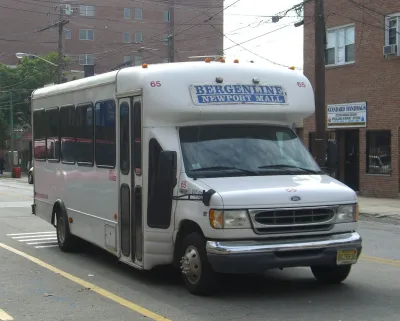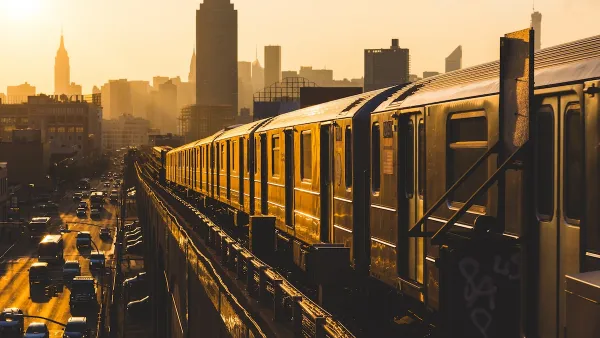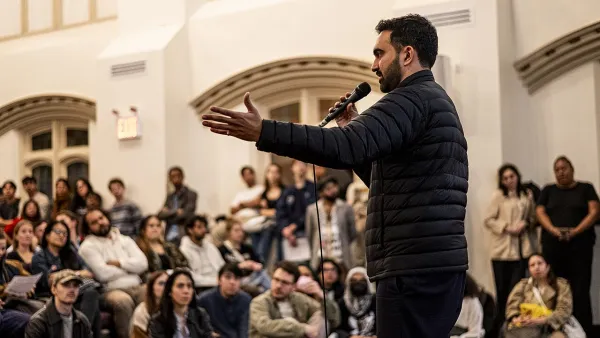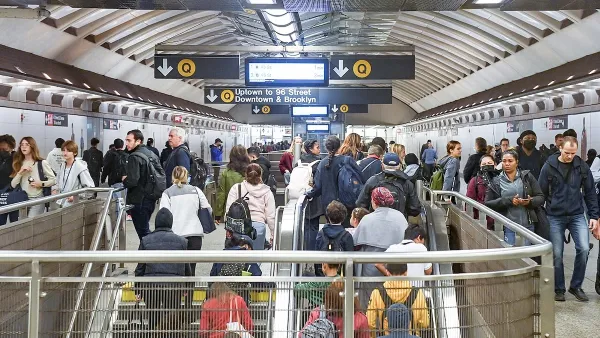A semi-formal transportation system has served New Yorkers for half a century, but complex regulations prevent most drivers from operating legally.

An unofficial transportation system has been a lifeline for thousands of New Yorkers, but increasing operating costs and regulatory hurdles put the network of ‘dollar vans’ in jeopardy.
Andrés Pacheco-Girón interviews riders and operators for a piece for Feet in 2 Worlds, explaining that the system grew out of largely immigrant communities’ experience with informal transit systems in other countries. “Following the New Yorker tradition of naming things after their price — like dollar pizza slices, or quarter waters — dollar vans became part of the fabric of the city.”
The commuter vans started operating in the 1970s and have proliferated since. They now charge varying rates based on routes and locations, and offer efficiency often unmatched by existing MTA lines.
But they operate in a legal grey area; hailing a dollar van on the street is technically illegal, and “Drivers also face challenges meeting the current requirements set by the city Taxi Limousine Commission, or TLC. Requirements include regular TLC inspections and insurance costs that can go as high as 50,000 dollars.” As of October 2024, there were 35 licensed commuter vans in the city, but many more can be seen operating on city streets.
Advocates like the Commuter Van Association of New York want to see the city reduce financial and regulatory burdens. Meanwhile, a commuter van startup is trying to modernize the industry with electric vehicles, which could lower operating costs.
FULL STORY: How NYC Dollar Vans Are Adapting for the Future

Maui's Vacation Rental Debate Turns Ugly
Verbal attacks, misinformation campaigns and fistfights plague a high-stakes debate to convert thousands of vacation rentals into long-term housing.

Planetizen Federal Action Tracker
A weekly monitor of how Trump’s orders and actions are impacting planners and planning in America.

Chicago’s Ghost Rails
Just beneath the surface of the modern city lie the remnants of its expansive early 20th-century streetcar system.

Bend, Oregon Zoning Reforms Prioritize Small-Scale Housing
The city altered its zoning code to allow multi-family housing and eliminated parking mandates citywide.

Amtrak Cutting Jobs, Funding to High-Speed Rail
The agency plans to cut 10 percent of its workforce and has confirmed it will not fund new high-speed rail projects.

LA Denies Basic Services to Unhoused Residents
The city has repeatedly failed to respond to requests for trash pickup at encampment sites, and eliminated a program that provided mobile showers and toilets.
Urban Design for Planners 1: Software Tools
This six-course series explores essential urban design concepts using open source software and equips planners with the tools they need to participate fully in the urban design process.
Planning for Universal Design
Learn the tools for implementing Universal Design in planning regulations.
planning NEXT
Appalachian Highlands Housing Partners
Mpact (founded as Rail~Volution)
City of Camden Redevelopment Agency
City of Astoria
City of Portland
City of Laramie





























